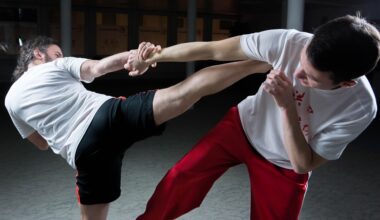Functional Fitness Training: Boosting Cognitive Health in Seniors
Functional fitness training is an essential approach that focuses on enhancing seniors’ mobility, strength, and overall well-being. This training method offers the advantage of improving daily activities, enabling seniors to maintain independence and promote better cognitive health. Specifically designed activities build strength, flexibility, and endurance, targeting movements that seniors engage in regularly. As our body ages, it becomes increasingly important to modify and adapt workouts that cater to our physical changes. Engaging in this kind of exercise can significantly reduce the risk of falls and injuries. Moreover, the mental stimulation provided during functional workouts helps in maintaining cognitive health as well. Studies indicate a direct correlation between physical activity and improved memory function in older adults. The social interaction accompanying group classes fosters a sense of community, further enhancing psychological health. Overall, functional fitness training cultivates a holistic approach to wellness, balancing body and mind. Through consistent participation in functional training activities, seniors can experience improved quality of life, increased confidence, and a proactive engagement in their health journey.
Cognitive health is paramount for overall well-being, particularly for seniors facing age-related challenges. Recent research emphasizes the importance of regular physical activity in sustaining cognitive abilities among older adults. Functional fitness training uniquely combines both mental and physical exercises, promoting brain function alongside physical strength. Elements such as coordination, balance, and strength are key components of this fitness approach. Activities like weight shifts and stability exercises not only engage the body but also stimulate cognitive processing and memory recall. Additionally, engaging in such comprehensive routines aids in enhancing executive functions, including problem-solving and decision-making skills. Integrating functional fitness within a senior’s regular routine can catalyze positive outcomes for mental sharpness. Furthermore, participation in social fitness programs adds an essential layer, where seniors can connect with peers, thereby combating isolation and loneliness. The encouragement derived from group classes can motivate continuous participation, making physical activity a more enjoyable task. As seniors embark on their fitness journey, recognizing the synergy between cognitive and physical health will empower them to make informed choices while fostering healthier lifestyles.
The principles of functional fitness training involve more than simple exercises; they encapsulate a philosophy of living actively while maintaining independence. By focusing on core stability, seniors learn to balance effectively, which is critical as balance can deteriorate with age. Training the core muscles leads to better posture and reduced risk of falls, thereby providing a safeguard against common injuries associated with falling. Functional exercises often mimic everyday tasks, such as reaching, bending, and twisting, preparing the body for real-life situations. These practical movements enhance body awareness and functionality, enabling seniors to perform their daily routines with ease. Additionally, exercises that promote strength and endurance significantly improve energy levels, encouraging an active lifestyle. Incorporating resistance training, flexibility, and aerobic activities into functional workouts ensures a comprehensive approach that holistically addresses both physical and cognitive dimensions. Regular participants of functional fitness report higher energy levels, improved mood, and general satisfaction in life. The mindset around aging can shift dramatically, leading older adults to embrace physical activity as a natural part of their lives, ultimately beneficial to both body and mind.
Social Aspects of Functional Fitness Training
Incorporating a social aspect to functional fitness training plays a vital role in enhancing cognitive health, particularly among seniors. Group settings provide opportunities for social interactions that are crucial for emotional well-being. Being surrounded by peers fosters camaraderie and support, allowing seniors to motivate one another during workouts. These interactions can reduce feelings of loneliness and isolation, common issues in older populations. Engaging with like-minded individuals creates a community of encouragement and accountability. Additionally, group classes often introduce fun elements to workouts, providing a sense of belonging that encourages regular attendance. Research has shown that participation in social fitness programs can improve mental health outcomes while reducing stress levels. The continuous social engagement nurtures brain health by stimulating cognitive processes associated with conversations and collaboration. Friendships formed through these programs can further extend beyond the class, enriching the lives of seniors. Ultimately, the social connectivity provided by functional fitness training transcends workout routines, leading to improved mental sharpness and a joyful approach to physical activity throughout aging.
Moreover, the cognitive challenges presented in functional fitness training play an integral role in mental health maintenance among seniors. Exercises demanding concentration, precision, and balance can stimulate brain activity, promoting neuroplasticity. The brain’s ability to adapt and form new connections is essential for cognitive resilience as we age. Functional workouts often require the integration of both physical and mental tasks, such as coordinating movements while making decisions about timing and rhythm. This multi-tasking aspect exercises different brain regions, enhancing memory function and processing speed. Engaging in varied functional activities prevents the monotony that can hinder motivation, a common obstacle for seniors in fitness. Clients can experience a sense of achievement and competence when mastering challenging exercises, boosting self-esteem. Additionally, the anticipation and enjoyment of learning new skills keep the brain active while benefiting the body. In turn, maintaining an active, engaged lifestyle can mitigate the risk of cognitive decline related to senior aging. Thus, embracing functional fitness presents an effective strategy for fostering long-term cognitive health in aging populations.
Safety Considerations in Functional Fitness Training
Safety is paramount when designing a functional fitness program for seniors, due to varying health conditions and fitness levels. A tailored approach ensures that exercises are appropriate, minimizing any risks of injury. It is crucial to assess each participant’s existing condition before initiating any training session, allowing for modifications as needed. Incorporating lighter weights, resistance bands, or balance aids can provide necessary support during workouts. Instructors should focus on teaching proper techniques to avoid strains and sprains during exercises. Moreover, maintaining an open line of communication regarding any discomfort participants feel is essential in fostering a safe environment. As part of program design, warm-up and cool-down periods are vital in preparing the body and preventing injuries while enhancing flexibility. Engaging seniors in discussions about their goals and any previous injuries will promote greater confidence. Furthermore, regular evaluations can identify adaptions that may be needed as participants progress. A well-structured, safe training program fosters adherence, leading to long-term engagement in functional fitness routines and promoting overall health.
In conclusion, functional fitness training emerges as a powerful advocate for boosting cognitive health in seniors. The unique combination of physical and mental engagement encourages not just movement but a comprehensive lifestyle change. Empowering seniors to take charge of their health leads to improvements that extend beyond the gym. Regular participation can foster stronger relationships, provide a sense of belonging, and ultimately enhance life enjoyment. As society continues to recognize the growing importance of senior health, functional fitness training will undoubtedly play a pivotal role in nurturing both mental and physical well-being. By integrating strength, flexibility, and social interactions, seniors can not only maintain independence but thrive as they age. Addressing the specifics of cognitive health through tailored functional routines can facilitate a proactive approach to aging. For families and caregivers, endorsing functional fitness represents an invaluable support in enhancing quality of life for their loved ones. With ongoing research supporting these practices, the future looks bright for seniors determined to lead active, fulfilling lives through functional fitness training.






